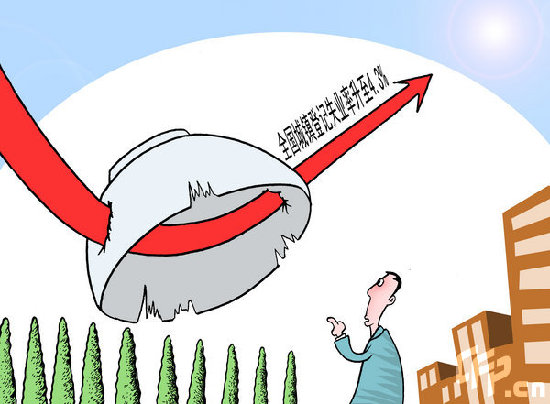It is reassuring that the latest official statistics indicate that China's labor situation is not as bad as many people have feared.
Yet, if the country is to consolidate and sustain its current momentum of economic recovery, policymakers should keep focusing on creating more jobs, especially for farmer-turned-migrant workers.
China's urban registered unemployment rate rose to 4.3 percent in the first quarter from 4.2 percent at the end of last year, according to the Ministry of Human Resources and Social Security.
|

|
|
China's urban registered unemployment rate rose to 4.3 percent in the first quarter from 4.2 percent at the end of last year, according to the Ministry of Human Resources and Social Security. |
Such a rise in urban unemployment, to our delight, is much milder than expected, given the rapid slowdown of the Chinese economy. The country's gross domestic product grew by only 6.1 percent in the first quarter of this year, the slowest pace in about a decade.
Though this official unemployment number can't depict the country's overall labor situation, it gives a useful clue about the trend of job growth.
That new jobs created in cities increased steadily from 690,000 in January to 930,000 in February and 1.06 million in March clearly indicates an improvement in the urban labor market.
A more encouraging message from the Ministry of Human Resources and Social Security is that 90 percent of the migrant workers, who returned to rural homes before the Spring Festival, went back to cities for jobs, and only about 7 million of them still stayed at home by the end of the first quarter.
Since Chinese farmers earn nearly 40 percent of their incomes from jobs in the city. An early government survey, revealing that 20 million migrant workers lost their jobs before the Chinese lunar new year, had shocked the public.
If the grave unemployment reality for migrant workers can't be promptly addressed, Chinese farmers will have no chance to narrow their income gap with urban residents and the government's efforts to boost rural consumption may be of no use.
Fortunately, thanks to the government's all-out efforts to boost job growth, most of the migrant workers have now returned to work in cities and many of those who stayed home have also found local employment.
China's road to recovery remains long, so its battle against rising unemployment will not end any time soon.
Policymakers of the country should build on the current momentum to promote a sustainable job-creating recovery.
(China Daily April 24, 2009)